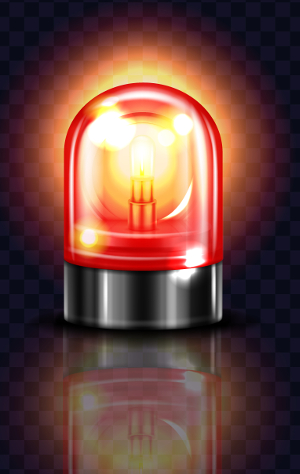How is your plant’s Early Warning System doing?
Your plant has an Early Warning System to prevent serious equipment damage: IT’S YOU!

Machines almost never fail without giving a warning. There will be a change in sound, vibration, smell or movement on the machine. You have the tools and the ability to monitor your equipment. Pay attention and you may be able to avoid emergencies and reduce the cost of repairs.
Paula often gets phone calls, “It’s been acting up all week. Now it won’t run at all and I have all this work to get done.” Your machine was warning you but you were not listening. You told them, “Hit the reset button and keep pressing. We don’t have time right now.”
By paying attention, you can schedule the repair at a convenient time and avoid the extra cost of an emergency repair. The parts might have to be flown in overnight. Or your staff are standing around waiting. That is expensive. Especially if you could have avoided the emergency by just observing. Problems do not fix themselves. When a part is worn out someone has to replace it. Even if the machine starts working again, you are on borrowed time.
Sound

Every machine has a particular sound. You hear it all day long every day. Click click thunk bang hiss.
You know what is ‘normal’. You don’t need to understand how the machine works. You just need to observe when the sound has changed and do something about it.
You need to learn what sounds indicate trouble. A dry cleaning machine makes a particular splashing sound when the button trap is plugged and it’s trying to extract. A boiler pump whines when it is steam locked.
What about a scraping sound as the dryer goes around? Better check – something is stuck in one of the holes in the basket. It scrapes on the shell as it turns. And, yes, it will cause serious damage if you don’t take care of it.
You can also listen for hissing sounds – air, vacuum or steam leaks. Or dripping/running water – is that normal?
Sight

Sometimes there’s a change in appearance – colour, texture, water on the floor. Are you seeing this?
Look at the water in your boiler sight glass. Don’t just glance at it – watch it for a minute or two. Is the level bouncing up and down? Are there chunks of scale floating in the water? Those are early signs that something is wrong.
Is the soleplate on your steam electric iron discoloured? Your iron may be overheating. Better check it out before you melt something.
Does the padding on your shirt press look oily or dirty? Check the vacuum hoses and the extract on your washer. What does the padding look like? Is it dirty or torn?
Look at the chests on your shirt unit. (This is an easy one.) See all that brown stuff baked onto the metal? That slows down the heat transfer. And when it gets bad enough it leaves noticeable brown stains on your shirts. Those brown spots didn’t appear overnight. It has been building up for months and you were too lazy to do something about it. Clean the chests once a week and it will never be a problem.
Can you see the levels in your soap pails? Don’t wait for the alarm to go off – have a look once a week so you don’t get into trouble.
Can you look at the computer on your machine and see what the alarm code is? Can you read a pressure gauge? Don’t just tell me it’s giving you an alarm again – give me the error code! If you give me good information, I can give you better, cheaper repairs.
Whenever you walk through your plant you should look for leaks. Open your eyes. Don’t ignore the problems that you can see.
Smell

We have been talking about watching and listening to your machines. It is also important to smell them. When your washer is running, you can smell the detergent. When you switch to wet cleaning, there is a different smell.
Have you ever gone into your boiler room and your nose burns and your eyes water? Pay attention! Your boiler is starved for oxygen. Maybe a fresh air duct is plugged with lint. A boiler in that condition could backfire and cause some damage. It may also be releasing carbon monoxide into your building.
Have you ever taken a load out of your dryer and it smells hot? It probably is. Get it checked before you damage a garment or start a fire.
Your nose will tell you if there is a solvent leak on your dry cleaning machine. Or the solvent may have a ‘dirty socks’ smell if the water separator needs cleaning. Can you tell the difference between unburned natural gas and exhaust?
Electric motors make a particular smell when the windings burn out. If you smell that, start turning things off. By the time you see the smoke it is too late. There may be a motor that is overloaded. If you move quickly, you might be able to shut it down before the damage is permanent.
Vibration

Does the floor shake when the washer extracts? Do the walls rumble when the boiler is running? Pay attention to what is normal and then observe when there is a change.
Put your hand on the machine while it is running. Get used to the feel of it. Then you will know when there has been a change.
Does the buck on the shirt unit bang when it transfers in? The shock absorber is failing. It’s not a big problem yet, but your operator is spending more time doing touch-ups. These changes happen gradually. Costs go up and quality goes down, but no one notices. Unless you deliberately pay attention to your machines.
“I’ve heard this before”

You probably think it was a waste of time reading this article. You may be right. You already know everything I have told you. But what are you doing about it?
You may remember that I have already written an article like this one. But that was probably 20 years ago. We have a lot of new plant owners who may not have thought about these things.
Train your machine operators to pay attention to their machines. Pay attention when they say there is something different. They know. They listen to that machine all day long.
You want to improve your business? Your machines want to help – if only you’d pay attention.






